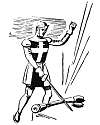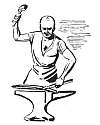|
A Radio Talk by Charles F. Kettering  In
"The Talisman," there is the Crusade incident where King Richard
and Saladin demonstrated the merits of their weapons. Richard, with a
tremendous stroke of his broad sword, severed a bar of iron. Saladin,
in contrast, with his flexible, keen-edged scimitar neatly cut in two a
soft pillow. This was more than an entertaining demonstration, it was a
comparison of two samples of steel made by different methods, and shows
the state of the blacksmith's or steelmaker's art in the 12th century. In
"The Talisman," there is the Crusade incident where King Richard
and Saladin demonstrated the merits of their weapons. Richard, with a
tremendous stroke of his broad sword, severed a bar of iron. Saladin,
in contrast, with his flexible, keen-edged scimitar neatly cut in two a
soft pillow. This was more than an entertaining demonstration, it was a
comparison of two samples of steel made by different methods, and shows
the state of the blacksmith's or steelmaker's art in the 12th century.But even in the Middle Ages, the steelmaker's trade was a very old one. Thirteen hundred years before that, the Romans defeated the Celts because the swords used by Celts were poorly tempered and had to be straightened after each blow.  In those days, each blacksmith had trade secrets which he had
developed himself, or which had been handed down to him by his father.
These blacksmiths knew that they had to have good metal to start with;
each added his own particular brand of skill along with a little good
luck. The latter was very important. Some craftsmen, however, produced
consistently fine
materials. For instance, the Damascus blade was
notable because of its flexibility and strength. Its steel contained a
great deal of carbon which normally makes metal hard and brittle. But
the sword-maker would heat the blade and hammer it and re-heat and
hammer it again and again until he had changed the entire structure of
the metal. The more it was hammered the more flexible it became, yet it
retained its hardness.
In those days, each blacksmith had trade secrets which he had
developed himself, or which had been handed down to him by his father.
These blacksmiths knew that they had to have good metal to start with;
each added his own particular brand of skill along with a little good
luck. The latter was very important. Some craftsmen, however, produced
consistently fine
materials. For instance, the Damascus blade was
notable because of its flexibility and strength. Its steel contained a
great deal of carbon which normally makes metal hard and brittle. But
the sword-maker would heat the blade and hammer it and re-heat and
hammer it again and again until he had changed the entire structure of
the metal. The more it was hammered the more flexible it became, yet it
retained its hardness. |








